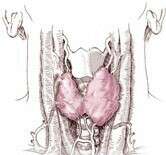Targeted thyroid testing not effective in pregnancy

(HealthDay)—A targeted thyroid testing approach is not effective during pregnancy in clinical practice, according to a study published online June 4 in Obstetrics & Gynecology.
Michaela Granfors, M.D., from Uppsala University in Sweden, and colleagues conducted a retrospective cohort study to evaluate the efficacy of a targeted thyroid testing approach during pregnancy. Data were obtained from the population-based Uppsala Biobank of Pregnant Women, in which blood samples were collected in gestational week 17 to 19. A total of 5,254 pregnant women were included, of which 891 were tested for thyroid dysfunction during pregnancy in clinical practice. Of the untested women, 1,006 were randomly selected for analyses of thyrotropin (TSH), free thyroxine levels, and thyroid peroxidase antibodies.
The researchers found that 12.6 percent in the targeted thyroid testing group and 12.1 percent in the untested group had trimester-specific TSH elevation (odds ratio, 1.04; P = 0.8). Overt hypothyroidism was seen in 1.1 and 0.7 percent of the groups, respectively (odds ratio, 1.57; P = 0.4).
"When implemented in clinical practice, targeted thyroid testing is unsatisfactory," the authors write. "If ongoing studies provide support for treatment of pregnant women with elevated TSH, universal thyroid testing appears the most reasonable approach."
More information:
Abstract
Full Text (subscription or payment may be required)
Copyright © 2014 HealthDay. All rights reserved.














